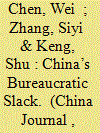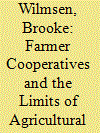|
|
|
Sort Order |
|
|
|
Items / Page
|
|
|
|
|
|
|
| Srl | Item |
| 1 |
ID:
190383


|
|
|
|
|
| Summary/Abstract |
In recent years, Party leaders have expressed concern about “bureaucratic slack,” or shirking, by local government officials. This article investigates the reasons for the emergence of bureaucratic slack in China’s political system. It verifies two popular hypotheses, namely, reduced material inducements and increased risk. Using a unique national survey of 1,789 local cadres, we confirm both hypotheses. Our survey also reveals differences across groups of local cadres. We find bureaucratic slack among lower-ranked cadres to be caused mainly by the lack of material inducements, while higher-ranked officials are more discouraged by increased risks. We conducted follow-up fieldwork to examine in greater depth why each cohort responded differently to the Xi administration’s administrative reforms and anticorruption drives.
|
|
|
|
|
|
|
|
|
|
|
|
|
|
|
|
| 2 |
ID:
190380


|
|
|
|
|
| Summary/Abstract |
There has been remarkable growth in the number of cooperatives in China in the past decade. This article asks: what role are cooperatives playing in driving China’s ambitious agricultural reforms? The scholarly literature describes farmer cooperatives as either an important entity for progressing China’s rural modernization agenda, a vehicle of exploitation and dispossession of smallholder farmers, or evidence of broader commitment to grassroots solidarity. Despite the rapid expansion of farmer cooperatives, the role that they play in the livelihoods of smallholder farmers in places where agriculture remains central and out-migration is low is poorly understood. To explore this, in 2019 we conducted a survey of 266 households in the mountains of Hubei Province. To illuminate the politics and dynamics on the ground, we followed up by conducting in-depth interviews with agribusinesses, cooperatives, households, and local government officials. Our findings suggest that although cooperatives are attempting to engage with smallholders, they are neither integrating nor exploiting them. While seemingly innocuous to the livelihoods of smallholder farmers, these entities serve a mostly political function, and it is in these dynamics that we observe the limits of agricultural reform. Where smallholder production is lucrative, land is valuable, and out-migration is minimal, local government appears to be “performing” reform, without forcing it on smallholders and thereby harming the local economy or risking social unrest.
|
|
|
|
|
|
|
|
|
|
|
|
|
|
|
|
| 3 |
ID:
190381


|
|
|
|
|
| Summary/Abstract |
The Chinese Party-state’s repression of politically sensitive social organizations is well-known. Less known, however, is how the central state has governed a broader range of social organizations that have violated laws or regulations and are hence considered “untrustworthy” in the context of the social credit system. Analyzing over 22,000 entries of social organizations on the Ministry of Civil Affairs’ National Social Organization Credit Information Public Notification Platform, this study examines which social organizations are publicly designated as untrustworthy—and why—as well as punishments and possibilities for redemption. The study finds that, on the one hand, the Xi Jinping administration has increased governance transparency by selectively publicizing untrustworthy organizations through the social credit system and standardizing their punishments. On the other hand, the administration continues to be opaque about its treatment of more politically sensitive organizations, such as those advocating for civil rights or representing marginalized communities. By maintaining an incomplete public list of banned organizations, the Party-state preserves maximum discretionary power over the most politically threatening sector. This governance approach breaks from the past in rendering civil society more legible while continuing the Party-state’s tradition of flexible control.
|
|
|
|
|
|
|
|
|
|
|
|
|
|
|
|
| 4 |
ID:
190384


|
|
|
|
|
| Summary/Abstract |
Leading small groups (领导小组, LSGs) are widely presumed to be the most important mechanisms for coordinating policy among the various government and Party bureaucracies in the Chinese political system. This article evaluates this assumption through a combination of statistical and case study analyses of LSGs operating under the State Council. Using information on 26 groups formed between 2004 and 2015, I estimate the effect of LSG participation on joint policy making. I demonstrate that some LSGs coordinate more effectively than others and argue that the reason for variation can be found in two factors: bureaucratic policy conflict and group leader authority. I argue that leader authority can spur agency coordination and move policy forward, while bureaucratic conflict can otherwise hinder coordination and create policy delays. Interaction between the two factors shapes the effectiveness of an LSG. A detailed case study of the two groups formed to promote health system reform, coupled with a shadow case study of the group for promoting the Belt and Road Initiative, illustrates the plausibility of the proposed mechanisms. Bureaucratic conflict and leader authority play important roles in China’s policy coordination processes.
|
|
|
|
|
|
|
|
|
|
|
|
|
|
|
|
| 5 |
ID:
190382


|
|
|
|
|
| Summary/Abstract |
Many researchers attribute the Chinese regime’s strong state capacity and resilience to its ability to control its local agents. Less well known, however, is how the state manages to secure compliance from village cadres—rural community leaders who are not state officials but who are directly elected by villagers. This essay explores and assesses how the state has attempted to expand its control over village cadres through a process of top-down “professionalization.” Using a county case study, I demonstrate that the professionalization of village cadres has taken place across four key dimensions: (1) cadre salary, (2) evaluation criteria, (3) office structure, and (4) training workshops. I argue that through the process of professionalization, village cadres have increasingly come to resemble state officials. However, professionalization has been only partially successful in increasing village cadres’ compliance with the state. Most critically, these reforms have failed to establish an adequate reward mechanism for village cadres, who have no opportunity for promotion and are poorly paid. As a result, the state’s ability to control and mobilize village cadres has not significantly improved.
|
|
|
|
|
|
|
|
|
|
|
|
|
|
|
|
|
|
|
|
|